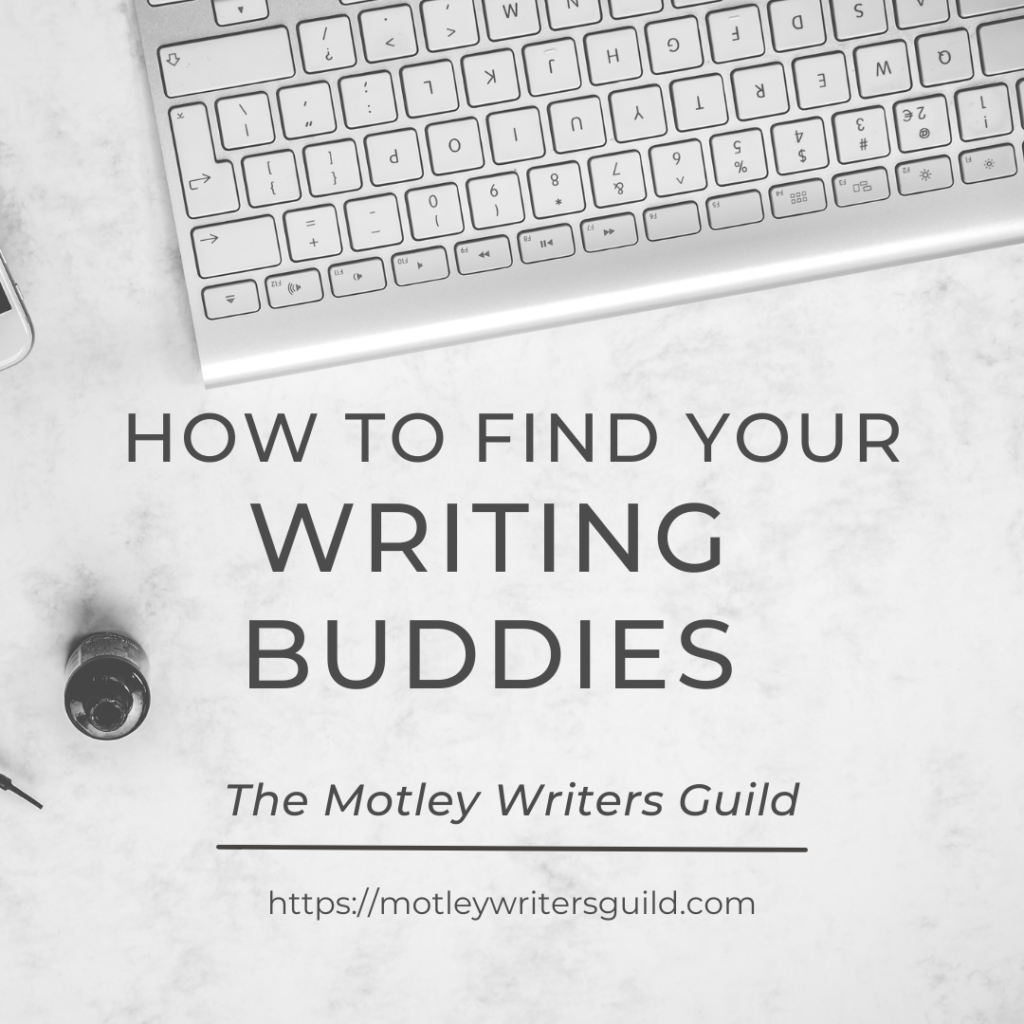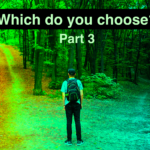While writing is usually a solo activity, all writers will benefit from finding others who share their interests. Whether you’re on the first word of your first page, or the last word of your gazillionth page, having an active support system is key to the creative process. Unless, of course, you’re perfect and your writing is perfect. In which case, this article is not for you! We wish you well in your endeavors and envy your flawlessness.
For everyone else, keep reading for the Guild tips on how to make friends, critique partners, writing groups and/or beta readers!
At the Motley Writers Guild, we started out as a bunch of individuals floating in the ether of creativeness and big dreams, then we came together through complete and utter chance to make a slurry of writerly goodness. Some met in person, then discovered their mutual love of writing through conversations. Some met online in writer-specific spaces. Both are great options, and we encourage everyone to try different avenues, because you’re going to get different results and varying degrees of success.

Before you go in search of your perfect writing buddy, or beta readers, be sure to spend some time with your #1 fan first.
Yourself.
Ask yourself, why do you write? What do you like about it? What do you hope to accomplish (if anything)? What genres are you interested in writing AND reading? What length projects do you produce? And, alternatively, what length projects are you wanting to read? What level writer are you? How good are you at critiquing? How good are you at taking constructive criticism?
These are all very important things to know before you scamper out and try to find people to swap work with, and equally important for finding a supportive writerly friend community (though slightly less essential for that task. You can make friends without knowing the answers to everything, but it does help!).
Asking yourself those things will not only help you in finding your community, but it will help you overall as a writer. Knowing who you are, what you want, and how you hope to achieve those goals is great for most aspects of life, not just writing.
So, once you’ve done a deep dive into You, Writer, you can start looking for people who will see your awesomeness and help you achieve even more awesome things! Bear in mind, partnerships and support are not one-way-streets. They’re footpaths, back roads, highways, or airline flight paths of support that take effort from you, too. You have to be willing to be just as invested in their projects as you are in your own. If you are just looking for someone to read your work and edit it for you without you doing the same back then you should consider paying a professional editor or professional beta reader (stay tuned for a blog post on how to find those too!). If you’re just looking for someone to bounce ideas off of and listen to you talk about all your wonderful big ideas, then you should talk to family and friends, not a fellow writer who probably has as much going on in their lives as you do. Active critique partners and writing communities require you to be involved and helpful first, and a sponge for criticism and editing second.
If you’re ready (and you’ve read this far) then GREAT!! Here’s our tips for finding (or founding) your own writing support system. Please note: we are only including free resources on this list. Many of the options have paying memberships too, but they aren’t required to join and participate. For paid communities (like The Next Big Writer) you can look to many articles elsewhere.
In no particular order (sorta):
- Be open about your writing to family and friends. Even though it’s scary, you may find that someone you already know is an avid writer and will want to partner with you as a buddy. These are sometimes the best partnerships! You already have rapport, and your shared love of writing will add depth to your relationship. If your friend/family member does not write the same, or similar, work as you (you write non-fiction, they write children’s books. You write horror, they write romance etc.), you may find that you are not a perfect match as buddies, but you can still support each other anyway! This is how A.J. and Em, and A.J. and M.C., became buddies. Leona and Em have long been writing buddies, though Em tends to skew towards fantasy and Leona towards upmarket literary fiction, their pairing works well because of their long history as friends first.
- Try a forum specifically meant as a writer community.
There are so many out there!
Once you find a forum you like, try striking up a conversation with a writer who’s posted work that speaks to you, or seems like it’s on a similar skill level as your own. Newbie areas are especially great for this, as the other people may not yet have a buddy or group they belong to, and they may be looking for someone just like you! Beta readers are also an excellent way to find partners through these communities (more on that later in the article).
Absolute Write (“AW”) www.absolutewrite.com is amazing, and a very active message board style structure. It’s heavily moderated, which means trolls don’t slip through the cracks. It requires approval from an admin, and you must be an active participant if you want to post looking for critiques of your work. This is the forum for writers, its got almost 70,000 members and is constantly being utilized so there’s always new work to read and amazing resources to utilize.
Scribophile https://www.scribophile.com/ is a site where you can post your work for critiquing. It works on a points system. Just like AW, you have to critique others’ work first before you can post your own. This is a great place to learn how to critique and what kind of criticism you’re looking for in your own work. It can be a bit repetitive though. For every great critiquer, there are two people who just breeze through your work doing minimal effort to get the points so they can post their own stuff. Don’t be one of those people! Use it as a way to learn, grow, and help others to grow first. What you put into it is what you will get out of it. Scribophile is how Em and A.D. met! After reading each other’s works they started messaging (messages have a number limit on Scribophile so if you find someone you like you will have to move off-platform to talk) and then emailing, then the conversation never stopped! Hopefully you will find your own Em or A.D. on there.
Critique Circle https://www.critiquecircle.com/landing is a forum where you can critique in exchange for having your own work critiqued. It has really neat features like a name generator, workshops and games.
Insecure Writer’s Support Group https://www.insecurewriterssupportgroup.com/ is a wonderful resource for anyone who is insecure about their writing. Which is… pretty much everyone. This community of like-minded writers will share your feelings of insecurity and hopefully help you to move past them!
Chronicles https://www.sffchronicles.com/ is for Fantasy and Sci-Fi writers! The largest online community specifically for SFF, you have a good chance of finding people who share the same interests as you, because they all do!
- Reddit (its not just for memes and edgelords, we promise!) www.reddit.com
Reddit is one of the largest international communities in the world, and it contains many “subreddits” (or “subs”) specifically geared towards writing. Because it has less of a requirement for you to reciprocate you can post here without actively helping anyone else, but why would you want to do that? Critiquing and reading others’ works helps you grow as a person, and as a writer. So get involved! Em Van Moore routinely posts on Reddit and offers critiques and encouragement there.
Warning: mods do a great job, but sometimes things can slip through the cracks. As a result, Reddit is NOT for children.
Subreddits:
r/justwriterthings (memes)
r/pubtips (for the publishing side of things)
Check out the r/writing “About” tab and click on “Related subreddits” for even more!
- Twitter and Instagram. Both are great and they’re actually recommended to have as a writer, regardless! Search for #writerscommunity on Twitter, and on IG you can look for your favorite writers, publishers, artists, and agents. By searching for them you may not necessarily find an open community, but you may find that you can discover other people hopeful to connect (usually in the comment section or through retweets). This route takes a lot more personal initiative and research to find a person or group you connect with, who want to be friends with you too. But the benefit of utilizing Twitter and Instagram is twofold: by looking for friends and community you can simultaneously grow your own following!
- Facebook groups. Great for people who like social media and are comfortable posting using their private (or business) profile.
Try searching in the community section for “your country” or “your area” + writer/novel/author
Some popular groups:
Writers’ Group ( https://www.facebook.com/groups/memberswritersgroup )
Creative Writing ( https://www.facebook.com/groups/wherecreativitylives/ )
Writers Unite! (search “writers unite” on facebook, as there’s a bunch of different groups)
Fiction Writing ( https://www.facebook.com/groups/fictionwritingoriginal/ )
- Local writers groups. While a lot of the world has moved online, there’s still something to be said for real, in-person writing support. Try searching for “your city/town/province/state/area” + writing group or writer’s group on your favorite search engine (we like Duck Duck Go).
- Writing conferences, conventions and literary festivals. The OG way of making new friends and learning new things! With many COVID-19 restrictions being lifted, lots of conventions/conferences are back and better than ever!
Heres the writers union master list: https://www.writersunion.ca/canadian-festivals-and-reading-series
If you’re Canadian try this amazing 2021 list from CBC: https://www.cbc.ca/books/canadawrites/a-guide-to-canadian-literary-festivals-1.4723741 we’ve read through it and the majority of these events are still taking place!
- Swap Buddies/Critique Partners/Beta readers. These are all, technically, different things, however we’ve put them under the same category because they’re similar ways of developing your writing community/friends.
One of the best ways to find a good critique partner is to be a good critique partner yourself. Hone your skills and your style on a message board-type setting (as mentioned above) and then once you’ve got some writing of your own that you’re ready to swap (be sure to proofread it, edit it, and revise it first! It’s not anyone else’s job to fix your spelling unless you’re paying them to do it!) you can search for beta readers and critique partners. Through those reciprocal relationships you can find people who share your interests and are invested in your work, and whose interest and work you can get invested in. If you find someone else doesn’t give the same quality of critiques and feedback that you give, you can expect they probably won’t be the right fit for you.
Once you’ve developed a mutually beneficial arrangement it’s an easy segue into friendship.
Perhaps your new friend has some other writer friends… perhaps you have some to share with them!
Perhaps you’ve got the makings of the next Great Writing Group, just from your new contacts and the enthusiasm you all share for writing!
No matter the route you take, if you are open and honest with yourself about what you’re looking for, and open with others about what you want, then finding your community is relatively easy. If it takes a while for you to find your people, that’s okay. And if you only ever really connect with one or two other people, that’s okay too. Writing is a process, and so is finding your writing brethren!
Good luck, best wishes and buckets of inspiration!
The Motley Writers Guild’s – Em Van Moore



